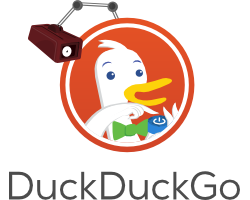
 Who decides?
Who decides?Selection of materials and formats
Areas of interest and expertise
Biases
Descriptions/cataloging
The library is PEOPLE.
BLAIS graphic by Suze Myers BC '16 from a T-shirt she designed for us
 Question Authorship
Question AuthorshipWho is responsible for the work?
Who is it for? Who isn't it for?
Who funded it?
How did the creator or funder get their position?
Who isn't positioned to create or fund this type of work?
How is the work described? Who describes it?
Using what/whose language?
Who made this very guide?
How is it arranged?
What does it privilege?
Graphic by Dorothy Joseph licensed for reuse: paper dollar bills swirling around a dollar coin with depicting the Statue of Liberty.
 Search Engine Comparison
Search Engine ComparisonIn group of two or three:
graphic: DuckDuckGo surveillance logo
This is a very short list of archival repositories that are close to Barnard's campus. For more help locating archival collections, navigating finding aids and scheduling research appointments with other archivists, or for an introduction to archival research, schedule a consultation with archives staff. You can also use the ArchiveGrid to search across finding aids and catalog records for archival collections in over 1,000 archival repositories, with some coverage outside of the United States. For non-U.S. archives in the Americas, I recommend the resources gathered by Archivistas en Espanglish (Latin America) and ArchivesCanada.ca (Canada).
All students deserve to be able to access course texts. The high costs of textbooks and other course materials prohibit access and perpetuate inequity, and Barnard librarians are partnering with students, faculty, and staff to increase access. The Barnard Library recommends the following strategies for students to access course texts at no cost, as well as advocating that faculty make their texts more accessible via the Library.
The following are some ways you can find affordable texts through the library and beyond. For more information, please check out the libraries Making Required Texts Affordable page on the library website.